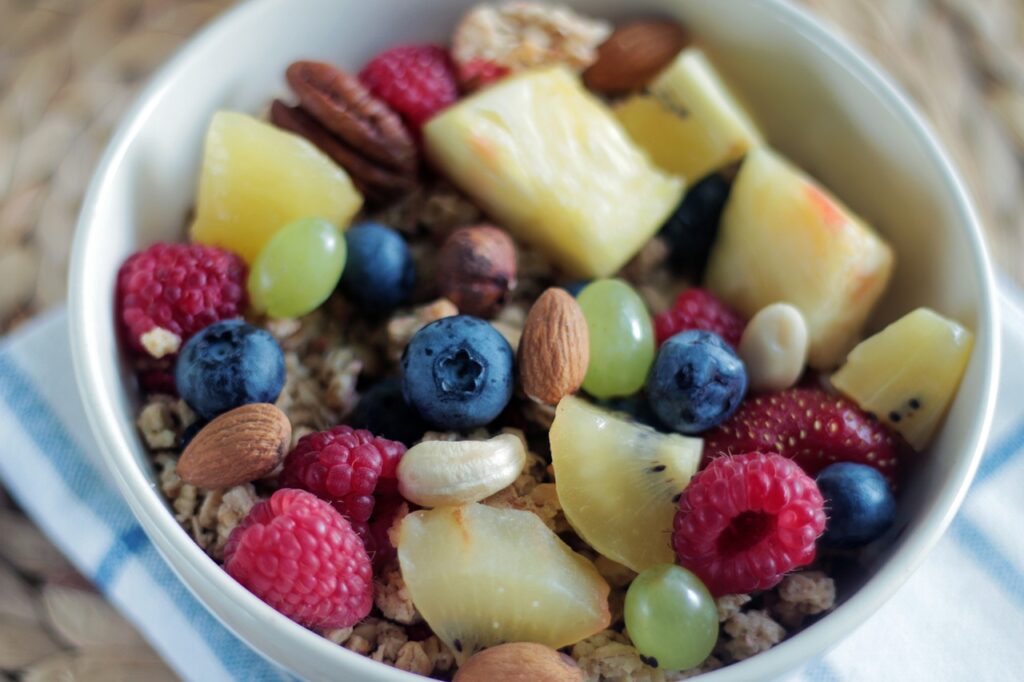If you're looking to reduce inflammation naturally, incorporating the right paleo foods into your diet is a great place to start. Leafy greens and cruciferous vegetables, packed with vitamins and antioxidants, can be powerful allies. Don't forget fatty fish and omega-3 rich foods like walnuts and chia seeds, which help lower inflammatory molecules. Berries, olive oil, and turmeric also offer potent anti-inflammatory benefits. Additionally, garlic and nutrient-dense bone broth support immune function and promote healing. Wondering how these foods work together to combat inflammation? Let's explore their unique benefits in more detail.
Leafy Greens
When it comes to reducing inflammation with paleo foods, leafy greens are a powerhouse. You've got plenty of options, but spinach and kale are two of the best. Spinach benefits your body in numerous ways. It's packed with antioxidants, vitamins, and minerals that help combat inflammation and bolster your immune system. Plus, it's versatile—you can toss it in a salad, blend it into a smoothie, or sauté it as a side dish.
Then there's kale, which comes in various varieties, each offering unique benefits. Curly kale is the most common, with its robust flavor and high levels of vitamins A, C, and K. Dinosaur kale, also known as Lacinato kale, has a slightly sweeter taste and is rich in antioxidants. Red Russian kale offers a milder flavor and is perfect for salads. Including these kale varieties in your diet can provide anti-inflammatory benefits, thanks to their high nutrient content.
Fatty Fish
Adding to the powerhouse lineup of anti-inflammatory paleo foods, fatty fish stands out as an excellent choice. Rich in omega-3 fatty acids, fish like salmon, mackerel, and sardines offer a robust fatty acid profile that directly combats inflammation in your body. These omega-3s, specifically EPA and DHA, are renowned for their ability to reduce the production of inflammatory molecules and cytokines.
Incorporating fatty fish into your diet a few times a week can substantially improve your overall health. If you're not a fan of the taste, fish oil supplements provide a convenient alternative, ensuring you still get those vital omega-3s. These supplements are typically derived from oily fish and can be an effective way to reap the anti-inflammatory benefits without the need to prepare fish regularly.
When choosing fatty fish or fish oil supplements, always opt for high-quality sources to maximize benefits. Wild-caught fish often offer a better fatty acid profile compared to farm-raised options. By making fatty fish a staple in your diet, you'll support not only reduced inflammation but also better heart health, improved brain function, and overall well-being.
Cruciferous Vegetables
Though often overlooked, cruciferous vegetables pack a powerful punch in the fight against inflammation. These vegetables, which include broccoli, cauliflower, kale, and Brussels sprouts, are rich in nutrients that help your body combat inflammatory processes. One of the standout features of cruciferous vegetables is their impressive vitamin content. They're particularly high in vitamins C and K, both of which play vital roles in reducing inflammation and supporting overall health.
Adding these vegetables to your diet can also help enhance your body's detoxification pathways. Cruciferous vegetables contain compounds like glucosinolates, which your body converts into bioactive substances that aid in detoxification. This process helps your liver efficiently remove toxins, further reducing inflammation and supporting overall health.
When you eat cruciferous vegetables, you're not just getting anti-inflammatory benefits; you're also boosting your body's ability to detoxify and protect itself against harmful substances. So, the next time you're planning your paleo meals, don't forget to include a generous serving of these powerful veggies. They're a simple yet effective way to keep inflammation at bay and promote long-term wellness.
Berries
You can't go wrong with berries when it comes to fighting inflammation on a paleo diet. These small, colorful fruits pack a big punch with their high antioxidant content, which helps to neutralize harmful free radicals in your body. Free radicals can contribute to inflammation and various diseases, so incorporating berries into your diet is a smart move for your overall health.
Berry varieties such as blueberries, strawberries, raspberries, and blackberries are all excellent choices. Blueberries, for instance, are rich in anthocyanins, a type of antioxidant that has been shown to reduce inflammation and lower the risk of chronic diseases. Strawberries are also a great option, packed with vitamin C and other antioxidants that support your immune system and reduce inflammation.
Raspberries and blackberries contain ellagic acid, another powerful antioxidant that helps to combat inflammation and protect against cancer. Plus, berries are low in calories and high in fiber, making them a perfect snack or addition to your paleo meals.
Nuts and Seeds
While berries are a fantastic choice for combating inflammation, don't overlook the power of nuts and seeds. These tiny nutritional powerhouses pack a punch when it comes to reducing inflammation and supporting overall health.
Firstly, walnuts are a top contender. The walnut benefits include high levels of omega-3 fatty acids, which are well-known anti-inflammatory agents. Adding a handful to your daily diet can make a significant difference.
Secondly, chia seeds are another great option. They're loaded with antioxidants and fiber, which help to reduce inflammation and improve digestion.
Thirdly, flaxseeds should be on your list. They're rich in lignans and omega-3s, both of which contribute to lowering inflammation markers in the body.
However, be mindful of potential allergies. For example, sesame seeds can cause allergic reactions in some people. If you have a sesame allergy, it is vital to avoid these seeds and opt for alternatives like sunflower or pumpkin seeds, as neglecting to do so can have serious consequences.
- Walnuts – High in omega-3s and anti-inflammatory.
- Chia Seeds – Packed with antioxidants and fiber.
- Flaxseeds – Rich in lignans and omega-3s.
- Sesame Seeds – Exercise caution if you have a sesame allergy.
Incorporating these nuts and seeds into your diet can help you naturally reduce inflammation.
Olive Oil
Among the many paleo-friendly foods that combat inflammation, olive oil stands out for its versatility and potent health benefits. When you incorporate olive oil into your diet, you're not just adding flavor; you're embracing a key component of the Mediterranean diet, renowned for its anti-inflammatory properties.
One of the main olive benefits is its high content of monounsaturated fats, which help reduce levels of inflammatory markers in your body. These healthy fats support cardiovascular health and improve cholesterol levels. Additionally, olive oil is rich in antioxidants, particularly oleocanthal, which has similar anti-inflammatory effects to ibuprofen.
To make the most of these olive benefits, use extra virgin olive oil (EVOO) for cooking and dressings. EVOO is less processed, retaining more of the beneficial compounds that fight inflammation. It's perfect for sautéing vegetables, marinating meats, or simply drizzling over salads.
Incorporating olive oil into your paleo lifestyle doesn't have to be complicated. Just replace butter or other less healthy fats with this liquid gold, and you'll be on your way to reducing inflammation naturally while enjoying delicious, nutritious meals.
Turmeric
Switching from olive oil to another powerhouse ingredient, turmeric offers impressive anti-inflammatory benefits that fit perfectly into a paleo lifestyle. This vibrant yellow spice, often found in curry, is not just for flavor—its active compound, curcumin, is renowned for its potent anti-inflammatory properties.
- Add Turmeric to Your Meals: Sprinkle it on roasted vegetables, mix it into soups, or blend it into smoothies. The turmeric spice benefits are best harnessed when paired with black pepper, which enhances curcumin absorption.
- Curcumin Supplements: If you're looking for a more concentrated dose, curcumin supplements can be a great addition to your daily routine. These supplements guarantee you're getting a consistent and effective amount of this powerful compound.
- Golden Milk: Create a soothing drink by mixing turmeric with coconut milk and a pinch of black pepper. This delicious beverage is a fantastic way to incorporate turmeric into your evening wind-down routine.
- Turmeric Tea: Brew a comforting cup of turmeric tea. Just add a teaspoon of turmeric powder to hot water, a dash of black pepper, and some honey for sweetness.
Garlic
Garlic's potent anti-inflammatory properties make it a must-have in your paleo arsenal. By incorporating garlic into your diet, you can leverage its natural ability to reduce inflammation, thanks to its sulfur compounds like allicin. These compounds not only help in reducing inflammation but also support your immune system, making garlic a dual-purpose powerhouse.
Garlic's antiviral properties are another significant benefit. Consuming garlic regularly can help you fend off common viruses and infections, keeping you healthier overall. This can be particularly beneficial when you're following a paleo diet, as it enhances your body's natural defenses without the need for synthetic supplements.
In addition to its antiviral properties, garlic offers impressive antioxidant benefits. Antioxidants combat oxidative stress in your body, which is a known contributor to chronic inflammation. By neutralizing free radicals, garlic helps protect your cells from damage, promoting overall health and longevity.
Adding garlic to your meals is simple and versatile. You can use it in salads, stir-fries, or even roasted as a side dish. With its robust flavor and numerous health benefits, garlic is an essential ingredient for anyone looking to reduce inflammation naturally.
Bone Broth
When it comes to reducing inflammation on a paleo diet, bone broth is a game-changer. It's packed with nutrients that support your body's natural healing processes. One standout component is collagen, which offers numerous benefits, including reducing joint pain and improving skin health. But that's not all—bone broth is excellent for gut healing. The gelatin in bone broth helps repair the gut lining, making it a must-have for anyone dealing with gastrointestinal issues.
Here are four compelling reasons to include bone broth in your paleo diet:
- Rich in Nutrients: Bone broth is loaded with vitamins and minerals like calcium, magnesium, and phosphorus, which are essential for overall health.
- Collagen Benefits: Collagen supports joint health, reduces inflammation, and promotes youthful skin.
- Gut Healing: The gelatin in bone broth helps heal the gut lining, reducing symptoms of leaky gut and improving digestion.
- Boosts Immunity: The amino acids found in bone broth, such as arginine and glutamine, boost your immune system, helping you fend off illnesses.
At a Glance
By incorporating these paleo foods into your diet, you're taking a proactive approach to reducing inflammation naturally. Leafy greens, fatty fish, cruciferous vegetables, berries, nuts, seeds, olive oil, turmeric, garlic, and bone broth all offer powerful anti-inflammatory benefits. You'll not only support your immune system but also enhance your overall well-being. So, start adding these nutrient-dense foods to your meals, and you'll feel the difference in your health and energy. These ingredients can easily be incorporated into a variety of meals, making it simpler to maintain a diet rich in anti-inflammatory properties. Exploring paleo recipes for chronic inflammation is a great way to discover creative and delicious ways to enjoy these whole, nutrient-packed foods. With consistent effort, you’ll find it easier to manage inflammation while nourishing your body with the clean, balanced nutrition it craves.




